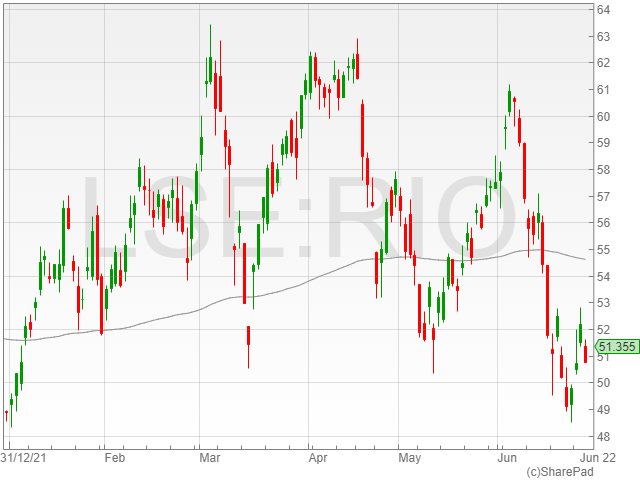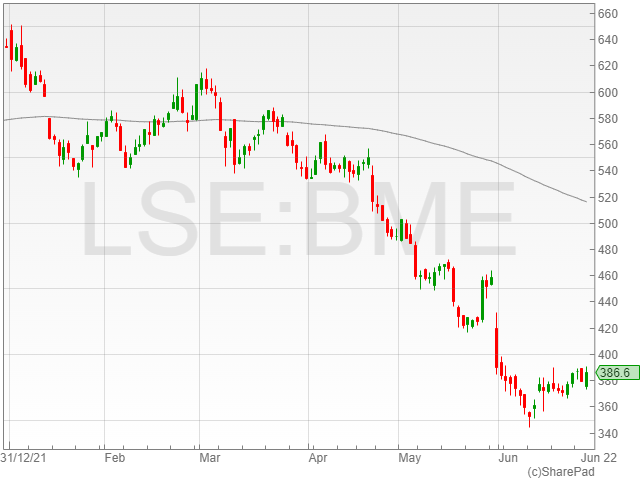The FTSE 100 was down in afternoon trading on Wednesday as the markets felt the cost of living crisis bite with consumer brands dragging down the index.
Drinks producer Diageo fell 3.7% to 3,540.5p and consumer goods brand Unilever dropped 0.7% to 3,712.5p as customers pared back on less essential retail purchases.
Mining and telecoms also suffered in morning trading, with the commodities surge from yesterday’s $600 billion G7 infrastructure fund gold rush dying down and resulting in a poor session for the sector.
Anglo American dropped 1.6% to 3,104.7p, Antofagasta fell 1.4% to 1,201.7p, Croda tumbled 2.3% to 6,276p, Endeavor slid 1.5% to 1,717.5p, Fresnillo declined 2.5% to 777.9p and Rio Tinto dipped 0.1% to 5,140p.

Meanwhile, Airtel Africa fell 1.2% to 137.3p and Vodafone slid 2% to 125.9p.
“So much for the big stock market comeback. Another day, another sea of red on the market,” said AJ Bell investment director Russ Mould.
“The FTSE 100 fell … dragged down by weakness in big consumer names such as Diageo and Unilever, while some of the miners and telecom stocks were also out of favour.”
Utilities price controls
Utilities groups balked at Ofgem price controls, as the institution eyed the sector’s bumper profits and dividends against the cost of living crisis and batted back the industry’s complaints in a move to bring some measure of control to the spiralling energy price chaos.
“Utility companies are not exactly jumping with joy at Ofgem’s new electricity distribution price control proposals, with SSE calling them ‘tough and stretching’,” said Mould.
“Energy providers would argue they are under pressure to invest heavily to improve infrastructure, make sure the supply network is resilient, and that everything is being done to hit net zero targets.”
“On the other hand, the regulator has long had its eye on the amount of money these companies make, and whether their profits and dividends should be so high.”
The new price controls are reportedly set to regulate the revenue that the UK’s network operators can earn from consumer payments towards local grid operation, which currently average £100 per year in addition to electricity costs.
Ofgem have also introduced a proposal for a £20.9 billion fund to build greener grids sourced from investors, sparing vulnerable consumers the expense as the cost of living continues to weigh on households across the country.
Centrica shares decreased 1.4% to 82.6p and SSE shares fell 1.8% to 1,634.5p, however National Grid, Severn Trent and United Utilities shares gained 0.7% to 1,077.5p, 1.1% to 2,773p and 0.8% to 1,034p, respectively.
B&M
B&M shares rose 1.7% to 386.2p as the discounter projected an optimistic outlook for FY 2023 despite a 9.1% drop in UK revenue over Q1.
The company reported an expected EBITDA of £550 million to £600 million in FY 2023, however group revenue for the Q1 period fell 2.2% on a constant currency basis to £1.16 billion against £1.18 billion year-on-year.

“Value retailer B&M should have been in its elements as the country faces a stalling economy,” said Mould.
“Its cheap prices appeal to cash-strapped individuals who are watching every penny and people looking to trade down from more expensive retailers. However, a drop in sales would suggest this tailwind is not as strong as previously thought.”
However, B&M also noted its recently launched its online trial across the UK, with 1,000 SKUs available for home delivery to customers.
“A home delivery trial has begun to see if there is enough demand for online purchases of bulkier and higher ticket items,” said Mould.
“That presents an opportunity to increase sales, yet whether such a service would contribute to profits near-term is unknown.”
“Typically, online services need to run on a large scale to make money so even if B&M moves from a trial to a national rollout, there is no guarantee the service will put cash in its pocket after paying for costs anytime soon.”
